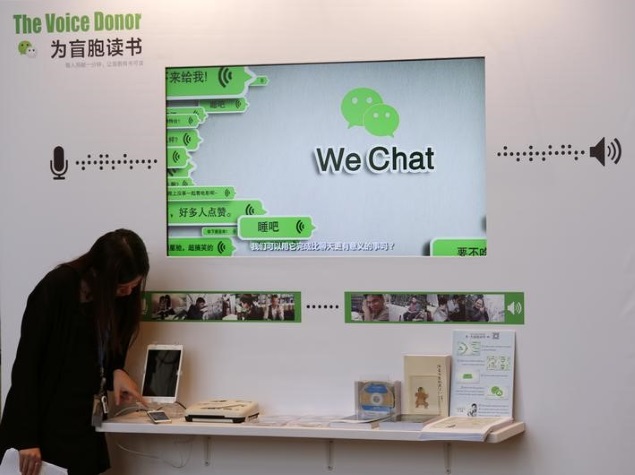- Home
- Social networking
- Social networking News
- Rumours, Sensationalism Are China Censorship Targets on WeChat: Study
Rumours, Sensationalism Are China Censorship Targets on WeChat: Study

The usual taboo subjects of calls for protests or collective action, the violent crackdown on pro-democracy protests around Tiananmen Square in June 1989, corruption and senior politicians were frequently censored, said the report by the University of Toronto's Citizen Lab.
But the key difference between WeChat, equivalent to China's Facebook Inc, and other social media, such as Chinese microblogging service Weibo Corp, was that a high proportion of censored posts related to rumours and misinformation, some of which were "more typical of sensationalism or tabloid gossip," Citizen Lab said.
Since Xi Jinping became president in early 2013, he has presided over an increasingly harsh crackdown on China's Internet, a sphere which the Communist Party has viewed with increasing importance and acknowledged it needs to control, academics and researchers say.
Tencent did not respond to requests for comment.
China's Internet regulator, the Cyberspace Administration of China, was not available for immediate comment outside of normal business hours, but has said previously it will punish those who break regulations concerning online activities.
At the heart of the disparity between WeChat and other online media could be China's sweeping online "anti-rumour campaign", which has clamped down on those spreading misinformation since it began in 2013, according to Citizen Lab.
Alternatively, censors may view WeChat as a place where more than messages related to public demonstrations should be culled, unlike other social media, the study said.
This runs counter to previous studies that have found the weight of online censorship tends to be on posts that could have a destabilising effect on society, most prominently by encouraging demonstrations or protests, whether or not they are in favour of or relate to the government.
Unlike with Weibo and other social media where posts are public, WeChat users must follow specific accounts to receive their messages.
Citizen Lab analysed more than 36,000 unique posts from more than 10,000 WeChat "official" or "public" accounts, which can send out single messages to a much larger number of followers than individual users and are commonly used by media organisations, brands and other companies.
The severity of China's Internet censorship, and the struggle of maintaining such a crackdown, were demonstrated in recent days when authorities detained several people in relation to a sex tape supposedly filmed in a Beijing outlet of clothing retailer Uniqlo, which went viral on social media despite censors' best efforts.
© Thomson Reuters 2015
Catch the latest from the Consumer Electronics Show on Gadgets 360, at our CES 2026 hub.
Related Stories
- Samsung Galaxy Unpacked 2025
- ChatGPT
- Redmi Note 14 Pro+
- iPhone 16
- Apple Vision Pro
- Oneplus 12
- OnePlus Nord CE 3 Lite 5G
- iPhone 13
- Xiaomi 14 Pro
- Oppo Find N3
- Tecno Spark Go (2023)
- Realme V30
- Best Phones Under 25000
- Samsung Galaxy S24 Series
- Cryptocurrency
- iQoo 12
- Samsung Galaxy S24 Ultra
- Giottus
- Samsung Galaxy Z Flip 5
- Apple 'Scary Fast'
- Housefull 5
- GoPro Hero 12 Black Review
- Invincible Season 2
- JioGlass
- HD Ready TV
- Laptop Under 50000
- Smartwatch Under 10000
- Latest Mobile Phones
- Compare Phones
- Samsung Galaxy A07 5G
- Vivo Y500i
- OnePlus Turbo 6V
- OnePlus Turbo 6
- Itel Zeno 20 Max
- OPPO Reno 15 Pro Mini 5G
- Poco M8 Pro 5G
- Motorola Signature
- Lenovo Yoga Slim 7x (2025)
- Lenovo Yoga Slim 7a
- Realme Pad 3
- OPPO Pad Air 5
- NoiseFit Pro 6R
- Xiaomi Watch 5
- Acerpure Nitro Z Series 100-inch QLED TV
- Samsung 43 Inch LED Ultra HD (4K) Smart TV (UA43UE81AFULXL)
- Asus ROG Ally
- Nintendo Switch Lite
- Haier 1.6 Ton 5 Star Inverter Split AC (HSU19G-MZAID5BN-INV)
- Haier 1.6 Ton 5 Star Inverter Split AC (HSU19G-MZAIM5BN-INV)

















